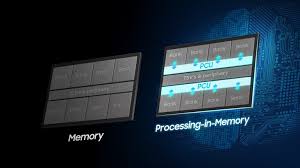Processing-In-Memory (PIM) Technology : Data Processing Directly In Memory

Israeli researchers have created software that allows data processing directly in memory, bypassing the CPU.
- This advancement, developed at the Israel Institute of Technology, aims to address the energy-intensive and time-consuming data transfers between memory and CPU, which are bottlenecks in modern computing.
- By reducing the CPU’s workload, this in-memory approach promises substantial time and energy savings.
- Python Programming Language with Digital Processing-In-Memory (PIM) Technology Combines Python with processing-in-memory (PIM) technology, enabling computations to take place directly in memory, bypassing the CPU.
- It Tackles the “memory wall” problem, where data transfer rates fall behind advancements in processor speeds and memory capacity.
- PyPIM platform introduces new instructions for in-memory operations.
- It Allows developers to use Python to create software for PIM systems.
- Includes a simulation tool to estimate performance gains from in-memory processing.
- It Reduces data transfer bottlenecks.
- It Accelerates processing for mathematical and algorithmic tasks.
- It Saves energy, making it efficient for high-performance computing needs.




